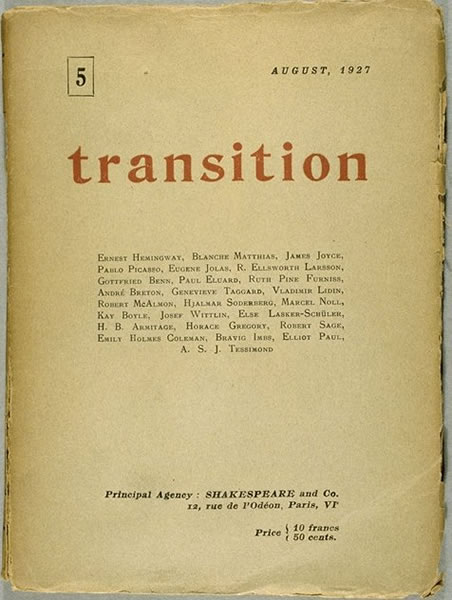
Title:
Wheels (1918 – 1921)
Wheels: An Anthology of Verse (1916 – 1917)
Date of Publication:
Dec. 1916 – Jan. 1921
Place(s) of Publication:
Oxford, England
Frequency of Publication:
Annually
Circulation:
Unknown
Publisher:
B.H. Blackwell, Oxford (1916 – 1919) Longmans, Green & Co., New York (1916 – 1918) L. Parsons, London (1920) C.W. Daniel, Ltd., London (1921)
Physical Description:
19 – 22 cm. in length. After the first issue, each new publication called a “cycle.” Fourth cycle dedicated to the memory of Wilfred Owen.
Price:
2 shillings, 6 pence per issue
Editor(s):
Edith Sitwell
Associate Editor(s):
Unknown
Libraries with Complete Original Issues:
Simon Fraser University; Northwestern University; University of Tulsa; Brown University; University of Iowa Searchable PDFs of full run available online at Brown University’s Modernist Journals Project
Reprint Editions:
Nendeln, Liechtenstein: Kraus Reprint
The poetry of the Sitwell siblings and their friends dominated the pages of Wheels. Most cycles of the magazine feature multiple poems by Edith Sitwell, Osbert Sitwell, Sacheverell Sitwell, Aldous Huxley, Nancy Cunard, Iris Tree, Sherard Vines, Helen Rootham, and Arnold James, and one issue featured seven poems by Wilfred Owen. Despite the somewhat small range of contributors, the magazine received praise from its petite audience and garnered high acclaim in newspaper reviews. The Sitwells organized Wheels in hopes of escaping the Georgian poetry that dominated 20th century England, instead developing a “bright, hard satiric style that came to be their trademark” (Martin). Their magazine published “modernism with visible roots in French decadent literature,” with cover art for the magazine suggesting Vorticism and Futurism (The Modernist Journals Project).
The first cycle of Wheels opened with the following poem by frequent contributor Nancy Cunard
WHEELS
I sometimes think that all our thoughts are wheels
Rolling forever through the painted world,
Moved by the cunning of a thousand clowns
Dressed paper-wise, with blatant rounded masks,
That take their multi-coloured caravans
From place to place, and act and leap and sing,
Catching the spinning hoops when cymbals clash.
And one is dressed as Fate, and one as Death,
The rest that represent Love, Joy and Sin,
Join hands in solemn stage-learnt ecstasy,
While Folly beats a drum with golden pegs,
And mocks that shrouded Jester called Despair.
The dwarves and other curious satellites,
Voluptuous-mouthed, with slyly-pointed steps,
Strut in the circus while the people stare.–
And some have sober faces white with chalk,
And roll the heavy wheels all through the streets
Of sleeping hearts, with ponderance and noise
Like weary armies on a solemn march.–
Now in the scented gardens of the night,
Where we are scattered like a pack of cards,
Our words are turned to spokes that thoughts may roll
And form a jangling chain around the world,
{Itself a fabulous wheel controlled by Time
Over the slow incline of centuries.)
So dreams and prayers and feelings born of sleep
As well as all the sun-gilt pageantry
Made out of summer breezes and hot noons,
Are in the great revolving of the spheres
Under the trampling of their chariot wheels.
Wheels. 1:1 (Dec. 1916): 9 – 10.
Edith Sitwell (Sept. 7, 1887 – Dec. 9, 1964)
Editor: Dec. 1916 – Jan. 1921
Dame Edith Sitwell was a preeminent British poet, born into an aristocratic family in Scarborough, England. Seeking to “communicate sensations, rather than to describe them,” she published half a dozen volumes of poetry and served as founder and editor of the little magazine Wheels (“Sitwell, Dame”). She came to the forefront of the British literary scene in 1923 with her recitation of her poetry sequence Façade, with a musical accompaniment by composer Sir William Walton. She continued producing poetry into the 1960s. Her critical work included books about poetry, Alexander Pope, and Queen Elizabeth I. She was made a Dame in 1954.
Nancy Cunard
“The Carnivals of Peace”
“Remorse”
“Wheels”
Aldous Huxley
“Love Song”
“Evening Party”
“Retrospect”
“Farewell to the Muses”
Wilfred Owen
“The Chances”
“The Dead Beat”
“The Sentry”
“Strange Meeting”
Helen Rootham
“Symphony”
“Nun”
“Envious Youth: 1916”
Iris Tree
“As a Nun’s Face”
“Gourmet”
“Romance”
“Mouth of the Dust I Kiss Corruption Absolute”
Sherard Vines
“War Strike”
“A Song for Grocers”
“New Signs”
“The Gospel of Chimneys”
“Carry On”
Wheels. The Modernist Journals Project. 2007. Brown University. 23 July 2009.
Martin, Robert K. “Dame Edith Sitwell.” British Poets, 1914-1945. Ed. Donald E. Stanford. Dictionary of Literary Biography Vol. 20. Detroit: Gale Research, 1983. Literature Resource Center. Gale. Davidson College Library, Davidson, NC. 8 July 2009.
Sitwell, Dame, Edith (1887 – 1964). The Penguin Biographical Dictionary of Women. London: Penguin, 1998. Credo Reference. Davidson College Library, Davidson, NC. 07 July 2009.



